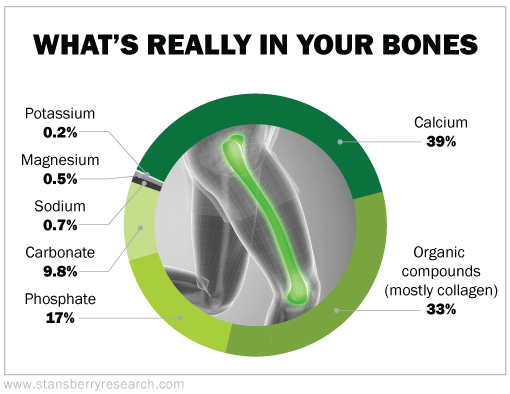Even chocolate flavoring can't help.
If you've ever had one of those calcium vitamin chews, you know what I mean. They're still stale and slightly chalky... and totally unnecessary.
About 43% of Americans take a supplement that contains calcium, either alone or with other vitamins and minerals.
But the vast majority aren't getting any benefit from them. In fact, they could be harmful.
For years, Big Pharma has fed us a myth that we need more calcium. It's a lie that's literally hardening our bodies... stiffening our arteries, forming stones in our kidneys, and breaking our bones.
In reality, many of the medical problems we face come from an overabundance of calcium.
Dr. Robert Thompson and Kathleen Barnes wrote the book on the subject, The Calcium Lie. In it, they cover the "calcium cascade." Too much calcium triggers a long line of problems as our bodies work harder to balance out the chemical levels...
I promise not to bog you down with a chemistry lesson. The simple chain of events is that when you have too much calcium, your body pulls more magnesium out of your kidneys. That process then leads to sodium and potassium depletion. That's a major problem...
Every cell in your body relies on the right balance of sodium and potassium. These two elements control gates in the cell's membrane that open and shut to move things like proteins, glucose, and more in and out of the cell. If cells don't have enough sodium or potassium, problems crop up everywhere.
That leads to some nasty stuff... think Type-2 diabetes, heart disease, anxiety, migraines, and more.
It's easy to see why folks take calcium though. They think it's important to keep their bones strong as they age. But in reality, bones need more than just calcium.
Calcium is important, making up 39% of our bones. Here's a look at the composition of bone...

But calcium alone won't help you. Calcium needs vitamin D to help your body absorb it.
Vitamin D regulates calcium and phosphorous. These chemicals in turn help regulate bone formation and resorption (the process whereby your body makes and breaks down bone continuously).
The connection between bone health and sunlight is obvious. Some researchers think the reason why bone fractures are so common in the elderly is due to decreased exposure to sunlight inside nursing homes and hospitals. I agree.
You also need vitamins C, E, and K, as well as magnesium and boron to help absorb calcium and build bone. Don't fall for the "one and done" thinking that calcium is all it takes.
And certainly don't fall for those supplements...
A 2015 study in the medical journal BMJ reviewed 59 randomized control trials involving calcium and bone mineral density (the measurement of how strong your bones are). Folks who increased their calcium through diet or through supplements saw small increases in density for the first year only. And even then, the increases were only about 1% to 2%.
This follows several other studies indicating that calcium supplements do little to build stronger, healthier bones. Many studies showed supplements to be ineffective... and even dangerous.
For example, calcium supplements increase your risk of kidney stones. In one study from the Annals of Internal Medicine, researchers followed women aged 34 to 59 for 12 years.
They measured calcium intake and the development of kidney stones. Women who took calcium supplements saw a much higher rate in the development of kidney stones. However, women who got calcium from dietary sources had a lower risk.
And, most controversial, studies show increased risk for heart attacks and strokes from calcium supplements.
There's a strong connection between calcium and heart disease. In fact, if your doctor suspects you have heart disease, he may order a calcium screening in your blood. Since some of the plaques that block your blood vessels contain calcium, the idea is that if you have excess calcium in your blood, you have more of these plaques. (Remember, plaques are buildups in your blood vessels that lead to heart attacks and stroke.)
The connection here is the resorption. As our bones break down and release calcium into our bodies, we wind up with too much calcium. That can lead to excess calcium-rich plaques in our blood vessels.
So don't go popping the calcium supplements yet...
Eat more calcium-rich foods, but also foods high in vitamins C, E, K, and magnesium and boron. Almonds, spinach, bananas, chard, pumpkin seeds, hazelnuts, honey, raisins, fish, berries, and brussels sprouts are all great additions to your diet to get these needed nutrients.
And get some exercise. Regular movement exercises like tai chi and walking will help you work on your balance and build some muscle tone. Add in weight-bearing exercise to keep your bones strong as well. Weight-bearing exercise simply means you're carrying the weight of your own body or lifting weights. So even things like jogging or racquet sports are great ways to get your heart and bones stronger.
What We're Reading...
- Something different: Gas prices are likely to keep climbing higher.
Here's to our health, wealth, and a great retirement,
Dr. David Eifrig and the Health & Wealth Bulletin Research Team
May 11, 2021
